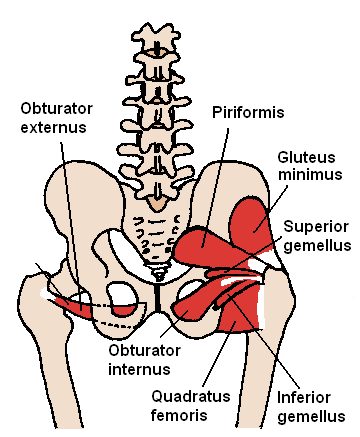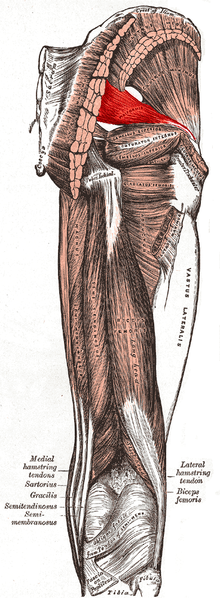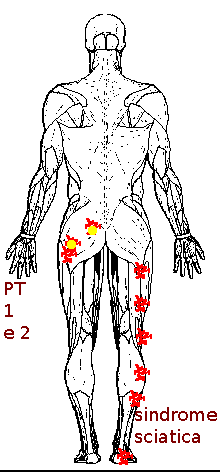The Piriformis (Latin for "per-shaped", so named by Spigelius in the 16th century) is one of the lateral rotators of the hip (the others being the Quadratus Femoris, Gemellus Inferior, Gemellus Superior, Obturator Externus, and Obturator Internus).
Anatomically, the Piriformis muscle attaches medially to the inner surface of the Sacrum. Laterally the tendon, which is common with the oter rotators, attaches to the Greater Trochanter of the Femur. The muscle body passes through the Greater Sciatic Foramen, andnd it is here that the nerve and blood vessel impingement and compression can occur.

Symptoms
Trigger Points in the Piriformis can cause a syndrome which is the result of three factors:
- referred Trigger Point pain
- nerve and blood vessel entrapment
- Sacroiliac joint dysfunction
The Trigger Point referral pain is located near the Sacroiliac region, over the buttock, near the hip area, and along the upper Hamstring area.
The Sciatic Nerve compression on the other hand, can cause full blown "sciatica" with pain extending as far as the outer foot.
Moreover, compression of other pelvic nerves such as the Pudendal Nerver can cause groin pain and even sexual dysfunctions such as painful sexual activity in women and impiotence in men.
Because the Piriformis exherts a pull on the Sacrum, the Sacroiliac joint can become misaligned with added local pain but also general structural derangement from tilted Sacrum and apparent shorter limb effect and therefore far reaching consequences for the whole body.

Therapy
The Piriformis muscle can be isolated by lying sidewise and rotating outward the leg with the knee flexed. The muscle will contract and can therefore be easily palpated.
The Trigger Points occur in two region: medially near the Sacrum, and laterally near the hip. They can be massaged with thumbs or the elbow. Self massage can be done using a tennis ball against the wall. Care should be taken in avoiding pressure over the Sciatic Nerve.
Gentle stretch should follow. The Piriformis can vbe stretched by lying supine and bringing the involved leg, bent at the knee, across the body toward the opposite leg. It is better to be gentle and never force the stretch.

